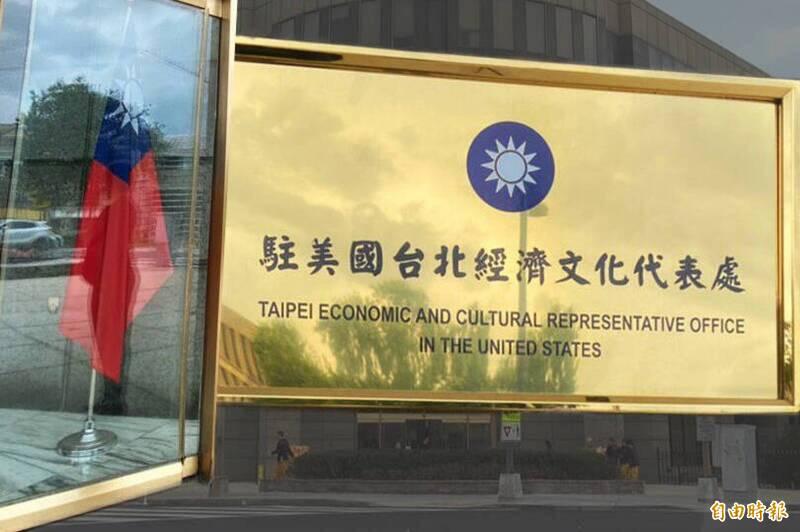A bill was introduced in the US Senate this week to negotiate renaming Taiwan’s de facto embassy in Washington as the “Taiwan representative office,” National Review reported yesterday.
The Taiwan Representative Office Act, introduced by US senators John Curtis and Jeff Merkley, would direct the US secretary of state to negotiate the rechristening of the Taipei Economic and Cultural Representative Office (TECRO).
The bill would also require US government officials to change all references in documents from TECRO to the new name.

Photo: Taipei Times
The legislation underscores the US’ commitment to Taiwan’s democracy and enhances clarity in the US-Taiwan relationship, Curtis said in a statement.
The choice to use “Taipei” instead of “Taiwan” in the office's name was to avoid offending China, he said.
“The United States shouldn’t tolerate pressure from China to undermine the Taiwanese people,” he said. “Instead, it should stand by its democratic allies and friends around the world facing pressure and coercion from authoritarian regimes.”
The act elevates the US’ relationship with Taiwan while maintaining that Washington’s “one China policy” is not to be confused with Beijing's “one China principle,” he said.
“By renaming TECRO as the Taiwan representative office, our bill acknowledges the reality that this office represents the people of Taiwan, not just the economic interests of the city of Taipei,” he said.
“Taiwan’s democracy is vital to peace and stability in the Indo-Pacific region, and the United States must continue pursuing opportunities that strengthen our partnership with Taiwan,” Merkley said in the statement.
Vincent Chao (趙怡翔), a former TECRO political director, told National Review that the proposed nomenclature change would be consistent with efforts to “push back against Chinese actions that degrade Taiwan’s international space” and is in line with US policy that has long used the name Taiwan, including in the 1979 Taiwan Relations Act.
“I think that this bill would be welcomed by the people of Taiwan and I think certainly there’s a hope that the sentiments expressed in this bill would be taken into consideration by the executive branch,” Chao was quoted as saying by the US magazine.
China has previously lashed out at countries that use Taiwan’s name for the country’s diplomatic outposts. In 2021, Lithuania allowed Taiwan to open a representative office that used the country’s name, rather than that of its capital city. The Chinese government responded with economic reprisals.
In the same year, the administration of former US president Joe Biden reportedly considered renaming TECRO to Taiwan representative office, but the change was never implemented.
In 2023 and last year, similar bills were introduced in the US House of Representatives and the Senate, but did not gain enough traction to pass in either chamber.
Curtis, who was then a member of the House, put forth one of the bills, while then-US senator Marco Rubio sponsored the other during the final two years of Biden's presidency.
Taiwan's representative offices in countries with which it does not have diplomatic ties are typically named the Taipei economic and cultural office or the Taipei representative office, in keeping with the host countries' preference to avoid any references that would imply Taiwan is a separate country from China.
As the US and Taiwan, officially named the Republic of China, ended official ties in 1979, the latter's Washington office has been called TECRO.

Taiwan has received more than US$70 million in royalties as of the end of last year from developing the F-16V jet as countries worldwide purchase or upgrade to this popular model, government and military officials said on Saturday. Taiwan funded the development of the F-16V jet and ended up the sole investor as other countries withdrew from the program. Now the F-16V is increasingly popular and countries must pay Taiwan a percentage in royalties when they purchase new F-16V aircraft or upgrade older F-16 models. The next five years are expected to be the peak for these royalties, with Taiwan potentially earning

STAY IN YOUR LANE: As the US and Israel attack Iran, the ministry has warned China not to overstep by including Taiwanese citizens in its evacuation orders The Ministry of Foreign Affairs (MOFA) yesterday rebuked a statement by China’s embassy in Israel that it would evacuate Taiwanese holders of Chinese travel documents from Israel amid the latter’s escalating conflict with Iran. Tensions have risen across the Middle East in the wake of US and Israeli airstrikes on Iran beginning Saturday. China subsequently issued an evacuation notice for its citizens. In a news release, the Chinese embassy in Israel said holders of “Taiwan compatriot permits (台胞證)” issued to Taiwanese nationals by Chinese authorities for travel to China — could register for evacuation to Egypt. In Taipei, the ministry yesterday said Taiwan

Taiwan is awaiting official notification from the US regarding the status of the Agreement on Reciprocal Trade (ART) after the US Supreme Court ruled US President Donald Trump's global tariffs unconstitutional. Speaking to reporters before a legislative hearing today, Premier Cho Jung-tai (卓榮泰) said that Taiwan's negotiation team remains focused on ensuring that the bilateral trade deal remains intact despite the legal challenge to Trump's tariff policy. "The US has pledged to notify its trade partners once the subsequent administrative and legal processes are finalized, and that certainly includes Taiwan," Cho said when asked about opposition parties’ doubts that the ART was

If China chose to invade Taiwan tomorrow, it would only have to sever three undersea fiber-optic cable clusters to cause a data blackout, Jason Hsu (許毓仁), a senior fellow at the Hudson Institute and former Chinese Nationalist Party (KMT) legislator, told a US security panel yesterday. In a Taiwan contingency, cable disruption would be one of the earliest preinvasion actions and the signal that escalation had begun, he said, adding that Taiwan’s current cable repair capabilities are insufficient. The US-China Economic and Security Review Commission (USCC) yesterday held a hearing on US-China Competition Under the Sea, with Hsu speaking on